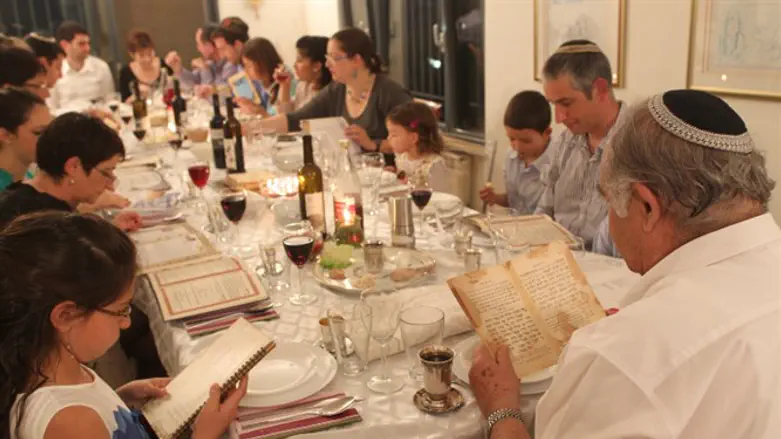
As is the case every year, the Torah Core Groups will again hold mass Seder events throughout the country. These groups are comprised of young religious Zionist families who move to development towns and poor neighborhoods in a group and work to improve education and bolster Judaism there. The Seder events are for needy families and individuals who have either nowhere to go or with whom to celebrate the holiday.
Ronel Bibi, coordinator of the Kiryat Moshe core group in Rehovot, talks about preparations and the significance these events hold for residents and group members themselves.
The seder organized by Bibi's group, one belonging to the Sha'alim network headed by Rabbi Rachamim Nissimi, is just one of the Seder nights organized by the network. "The group that Amitai Cohen founded and initiated is having a public Seder night for the third time in a neighborhood with a population of 60% Ethiopian immigrants and 30% immigrants from various countries; one of the most difficult neighborhoods in the country."
The Seder is part of a series of community-directed events conducted by the Orot Hanan group. "This year we will hold the event in a hostel in Kiryat Moshe (Rehovot) that is populated by Holocaust survivors. The Russian immigrants are alone and have no-one with whom to do the Seder."
Holding such a Seder, perhaps like the fact that members of the group leave their hometowns to join certain neighborhoods, involves a sacrifice. Bibi was asked whether this sacrifice does not adversely affect their young children who would have liked to see their relatives but instead find themselves together with lonely people whom they have never met and with whom it is doubtful they will be able to speak because of language difficulties. "This is not a simple sacrifice, and I admit that there is family hardship in doing such a thing, but with the hardship there is Divine assistance. Not for nothing does the Haggadah open with an invitation to 'all who are needy'. The Haggadah wants to explain to us that we left Egypt to do kindness, to proclaim a new message. There is sacrifice and this is not easy, but educating the children with the sense of 'let all who are needy come and join us"' that the group's families merit to perform are imprinted on the children and they have a share in it."
These remarks are made more acute by the question of the children's attitude towards group events in which they take part. Is this something that harms them in the long run? "It's a weighty question, but you can tell my personal story: We joined the Core Group three years ago. We arrived without friends or acquaintances; we felt like the Chabadniks who travel to distant places. Now the group numbers 35 families. For us - the children and my wife - there is nothing else but this place. When there is a sense of mission there is also a blessing; that is what Rabbi Nissimi inculcates into us. The children of the Chabad houses in Kathmandu are not maladjusted and have no problems but are actually happier than most people, because the mission stands at the center [of their lives]. People here actively pursue a mission."